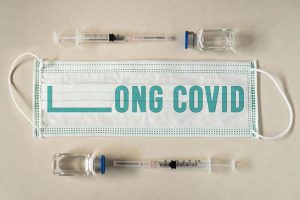 The COVID-19 pandemic has had a profound impact on the global population, with millions of people worldwide experiencing the acute symptoms and complications of the virus. However, for a significant number of individuals, the effects of COVID-19 extend beyond the acute phase, leading to a condition known as Long COVID. Long COVID, also referred to as post-acute sequelae of SARS-CoV-2 infection (PASC), is characterized by persistent symptoms that continue for weeks or even months after the initial infection has resolved. While Long COVID affects individuals from various demographic groups, recent studies have highlighted its particularly heavy burden on people with pre-existing arthritis. These individuals not only have to cope with the challenges of their underlying arthritis but also experience worsened pain, greater functional limitations, and other debilitating symptoms as a result of Long COVID. This article aims to explore the impact of Long COVID on patients with arthritis, shedding light on their experiences and the need for effective interventions to improve their functional status.
The COVID-19 pandemic has had a profound impact on the global population, with millions of people worldwide experiencing the acute symptoms and complications of the virus. However, for a significant number of individuals, the effects of COVID-19 extend beyond the acute phase, leading to a condition known as Long COVID. Long COVID, also referred to as post-acute sequelae of SARS-CoV-2 infection (PASC), is characterized by persistent symptoms that continue for weeks or even months after the initial infection has resolved. While Long COVID affects individuals from various demographic groups, recent studies have highlighted its particularly heavy burden on people with pre-existing arthritis. These individuals not only have to cope with the challenges of their underlying arthritis but also experience worsened pain, greater functional limitations, and other debilitating symptoms as a result of Long COVID. This article aims to explore the impact of Long COVID on patients with arthritis, shedding light on their experiences and the need for effective interventions to improve their functional status.
The Link Between Arthritis and Long COVID
A Canadian survey study conducted in Laval, Quebec, provided valuable insights into the experiences of individuals with arthritis who developed post-acute COVID symptoms. The study revealed that most of these patients reported worsened pain and greater functional limitations compared to their pre-COVID status. Over half of the respondents experienced increased susceptibility to fatigue, and a significant proportion complained of heightened breathlessness when climbing stairs. Additionally, a considerable number of individuals reported moderate to severe pain.
Notably, the survey findings indicated a substantial decline in mobility and overall activity levels among patients with Long COVID and arthritis. While less than 20% of respondents described their pre-COVID mobility and activity status as poor, about half reported poor current abilities. These changes in functional status were accompanied by a doubled unemployment rate among individuals with Long COVID after infection.
Risk Factors and Patient Characteristics
The survey also explored risk factors for developing Long COVID among individuals with arthritis. Female sex, the presence of one or more comorbidities, and hospitalization for COVID-19 were identified as significant risk factors. These findings suggest that certain patient characteristics may contribute to the likelihood of experiencing persistent symptoms after COVID-19 infection.
The respondents in the survey consisted of individuals who had a confirmed COVID-19 diagnosis and a history of arthritis. The mean age of the participants was 56, and the majority were women. The survey was completed a median of 410 days after the positive COVID test, allowing for a reflection of the long-term impact of Long COVID on individuals with arthritis.
Impact on Daily Life and Functioning
One of the key findings of the survey was the significant decline in overall health status among individuals with Long COVID and arthritis. While 78% of respondents graded their pre-COVID global health level as good, only 31% did so with Long COVID. Conversely, the percentage of respondents rating their health as poor increased from 3% to 24% following the onset of Long COVID symptoms.
Furthermore, the survey highlighted the profound impact of Long COVID on daily life and functioning. Individuals with Long COVID and arthritis reported substantial worsening of symptoms typically associated with Long COVID, such as cognitive difficulties, fatigue, and breathing problems. Although some participants experienced relatively minor worsening of specific health issues, a significant proportion reported moderate to severe changes across various domains.
Implications for Arthritis Management
The results of this survey underscore the importance of preventing COVID-19 infection in individuals with arthritis. However, for those who do contract the virus and develop Long COVID, timely and effective interventions are crucial to improving their functional status. The study authors emphasize the need for healthcare providers to recognize the unique challenges faced by individuals with arthritis and Long COVID, providing appropriate support and interventions to address the worsened pain, fatigue, and functional limitations experienced by these patients.
The findings also highlight the need for further research and a deeper understanding of the relationship between arthritis and Long COVID. As the prevalence of Long COVID among individuals with arthritis was higher than that of the general population, healthcare professionals should be vigilant in monitoring and addressing the specific needs of this patient population.
Long COVID presents a significant burden for individuals with pre-existing arthritis, exacerbating their pain, functional limitations, and overall health status. The results of the Canadian survey study shed light on the experiences of these patients and emphasize the urgent need for interventions to improve their functional status. By recognizing the unique challenges faced by individuals with arthritis and Long COVID, healthcare providers can provide the necessary support and care to mitigate the impact of Long COVID on these patients’ daily lives. Further research is needed to deepen our understanding of the relationship between arthritis and Long COVID, enabling the development of targeted interventions for this vulnerable population.
For persistent joint pain that is interfering with your daily activities, see a Tristate rheumatologist to make the correct diagnosis and begin the proper treatment.
Contact Us (859-331-3100) For More Information to Request an Appointment
—
 About Tristate Arthritis and Rheumatology
About Tristate Arthritis and Rheumatology
Tristate Arthritis and Rheumatology is first and largest Rheumatology practice in the Northern Kentucky area. Founded by Dr. Arthur Kunath in 1986, our rheumatology practice now consists of six doctors who are board certified in both Internal Medicine and Rheumatology and a Physician Assistant. Patients see one doctor (except in emergencies), thereby assuring continuity of care and an individualized doctor-patient atmosphere giving the physician the ability to establish personalized and detailed relationships. Our doctors have received numerous awards, including being listed as “Top Doctors” in Cincinnati Magazine, receiving the Patient’s Choice Award, the Most Compassionate Doctor Award, and the American College of Rheumatology’s “My Doc Rocks” award.
>> Learn More


